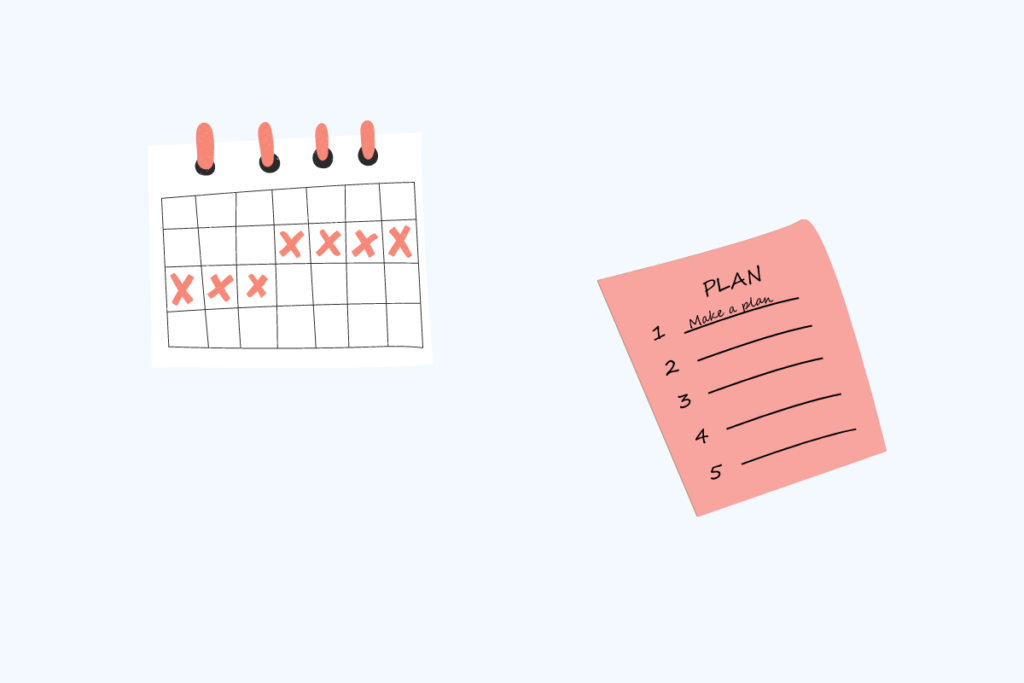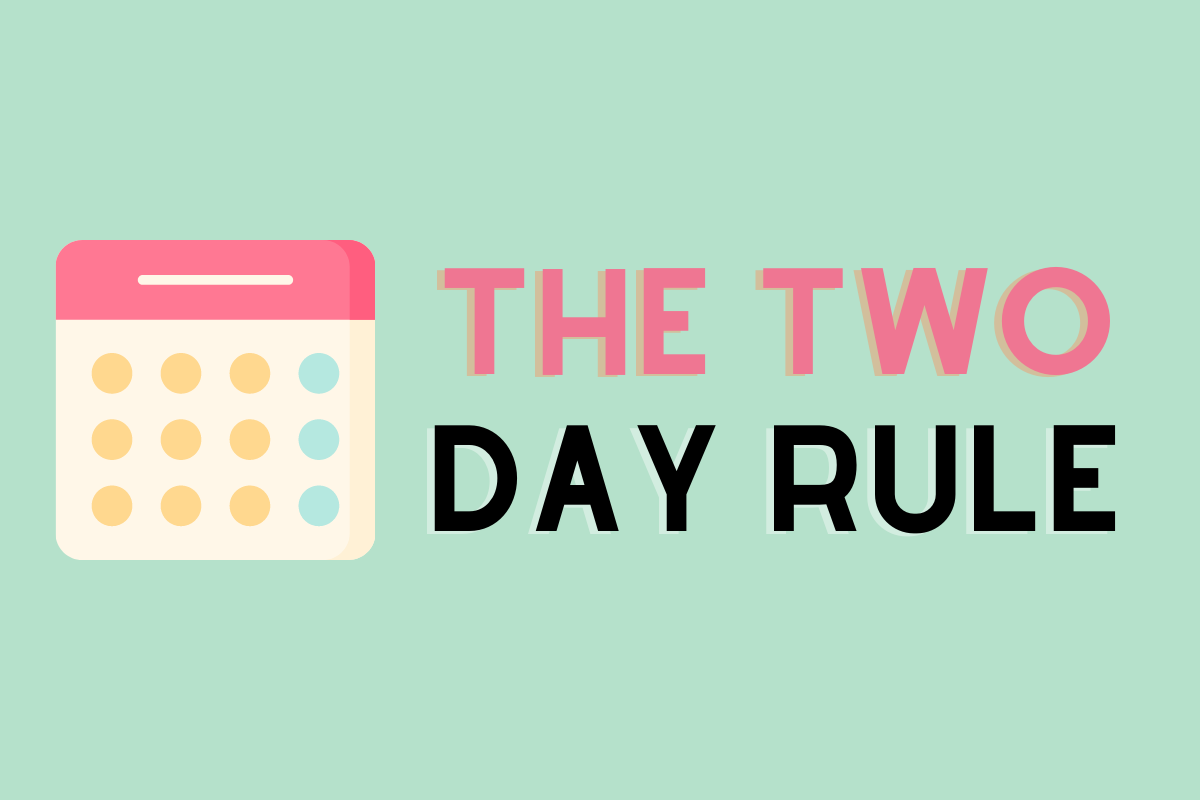The Two-Day Rule means never taking off more than a one-day break from a good habit or a productive routine. Even though you may have adopted a number of productive habits, there may come a time when suddenly you drop the ball. It’s okay to skip once and even better to plan for it, but skipping two days in a row is pretty much the last thing you want to do when adopting a new routine. There are also a few really helpful tactics and tools that can help dissuade you from ever letting yourself skip a productive activity two-days in a row.
Never skip two days in a row
It is so important that you don’t skip two days in a row, that a rule had to be made about it! The thing is, there is no getting around it, if you skip doing something twice in a row, then the balance switches in that at that point you will have “not” done the habit more than you “did” it. Now, that’s something you don’t want to make a habit of.
Consistency is key to pretty much everything, but it is absolutely vital when it comes to habit formation and incorporating new beneficial practices into your life. It’s so simple, the only way to have a new habit is to repeat it regularly and that means not skipping it two days more in a row. The Two-Day Rule is basically this: Under no circumstances should you skip two days in a row. I believe the message is now loud and clear.
We are all human and in our lives, unexpected things happen that are beyond our control. We may find ourselves feeling forced to abandon a good habit temporarily and that we have no choice in the matter. But there are tactics you can use to apply this rule that will show you that in many cases, we have the capability to take back the reins of our time.
How not to lapse

The number one way to establish a new practice in your life is to create time in your day for it. This means scheduling in the practice and prioritizing it as you would any other of your important time commitments. If you actually block out a specific time, whether it be on your daily or weekly or monthly calendars or even your to-do list, then you are much more likely to actually do the task. Plus you will have an opportunity to check something off as completed and work towards creating a link of checked off boxes so you can see how successful you have been and this will motivate you to stay consistent. If you leave the timing of the action vague, such as in the afternoon, then the outcome will be just as uncertain.
If you find yourself skipping one day, then don’t feel bad and reward yourself with some guilty pleasure. Simply focus on a task you can do then, such as preparing to return to the good habit tomorrow. If the practice you skipped out on involved work, an example of things you can do instead could be clearing out your inbox, reorganizing your desk, or writing a to-do list. If the habit you were trying to form was running, you could get your gear ready and laid out somewhere like the couch, so you have no choice but to actually physically handle it whether you run the next day or not. The mind is tricky in that sometimes at that point it is just easier to run than to put the clothes back away should you have chosen not to.
The most important thing is if you do miss a day (or two) make it count. There are ways that you can still benefit from a new practice on the days you don’t actually do it and this is from reflection. Sit back and think or write in a journal about what caused you to skip two days and what you can do to make sticking to this new routine easier.
Question your failure to launch
These are two very important yet different questions you need to ask yourself. The first one, which is: “Why did you skip to begin with?” involves understanding what factors could have triggered you to miss a routine you so coveted. Was it familial or work obligations or some other external element? For better awareness of how you function, truly ask yourself what caused you to break the chain you were building. “Was it a lack of sleep?”, “Why did other obligations get in the way?”, “Were you having fun?” or “Were you having too much fun?” These are the types of questions you want to really ask yourself.
If you were having “too” much fun, then, you want to truly assess ways to avoid negative triggers such as excessive alcohol or staying up too late and burning the candle at both ends. If you find alcohol negatively affects your life, then figure out other fun activities that are social and not centered around drinking. If your time is spread too thin and there are other pressing obligations, truly consider if there is a way you can delegate some of your responsibilities. If you were just having fun, then chalk it up as a win and return to the habit immediately with even more fervor.
“What could you have done differently?” is the second question you want to ask yourself.
Maybe you will find the time slot you allotted for the new routine is not optimal in which case you could test out doing the task at different times of the day and challenge yourself to see how productive you can be. Truly figuring out what time of day and which routine of yours a new habit should optimally follow for you to be most productive is a fun challenge and will put a positive twist to put on missing a day.
Stage your comeback!
You might consider tweaking the new practice to work more optimally for you. In other words, make it easier. Think about ways you can either alter the practice to fit in with other needs or routines or ensure that everything surrounding the practice makes doing it easier. Changing your environment to make the new habit take the forefront is a great way to recover from this loss.

One of the best things you do to keep motivated throughout any journey is to have an accountability buddy. Continuous interaction with someone supporting your goals is one of the best ways ever to stay on track and enjoy the entire process. If you don’t have one, get one today! It can be someone you know or someone anonymous, but they are out there, and they need you too!
Let’s face it, some days are better than other days. Especially, when it comes to taking on new challenges. But it is critical to stay in the zone you carved out for yourself as much as possible to remain highly motivated. If however, you veer, try to immediately and smoothly veer back into the good direction you were headed. As in the case with a car, if you veer too much for too long, you will inevitably topple over. The Two-Minute Rule aka “Never Skip Two Days” can be your mantra when things get hard to repeat to yourself to get going. If you make this a solid rule in your life and you promise yourself that you will stick to it, you and everyone around you will do anything in their power to make sure you fulfill it.
Having an accountability buddy to be your support system in times like these is a very valuable asset. But if you don’t have one you can be your own best friend and give yourself words of encouragement. Some people choose to hold themselves accountable in other creative ways such as “not so” negative reinforcement. For example, using tools such as the Lazy Jar app, people can set up their Fitbit with their credit card details on hand to make payment to a charity of their choice should they skip two days in a row. Similar motivational challenges could be encouraged by the workplace or better yet reversed with employers making payments to charities on behalf of staff members who never miss two days in a row.
The “Two-Day Rule” got a lot of hype when minimalism documentary filmmaker Matt D’Avella made a video explaining the rule in a 2019 YouTube video watched by over 4 million viewers. Funnily enough, his name is probably now more known for this concept than the fact that D’Avella was the director of the documentaries Minimalism: A Documentary About the Important Things (2015) and The Minimalists: Less is Now (2021). His highly-acclaimed films draw on the importance of the well-being of our living spaces and the objects we interact with in our lives. Streamlining your home and workspace are integral to being productive so maybe take a cue from this coincidence to spend that day off from your new quest organizing your surroundings. But basically, if you can’t do what you should have done then do something else.
Most of us tend to get really excited when we learn something new or embark on some new affirmative adventure in our lives, such as being more productive. In fact, we tend to be happiest when we are learning new things. We can be the greatest converts raving and ranting about this newfound system that has finally made everything click. After all, we can visibly see that it worked and it worked fast. But, there may come a moment along the line when suddenly you just stop. Things may come up in life or one day you might simply lose the drive.
There are two important points you can keep in mind all of the time that can help reaffirm your intentions. They are: The only way to be more productive is to be consistent and the only factor distinguishing between an expert and a beginner at anything is consistent practice.


